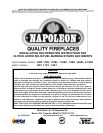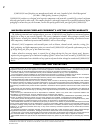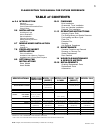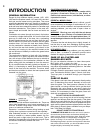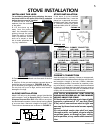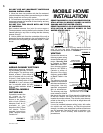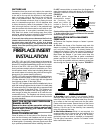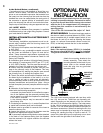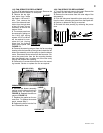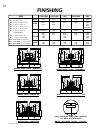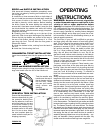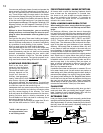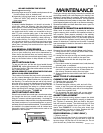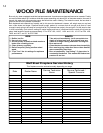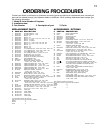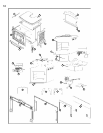
14
W415-0360 / 11.05.02
WOOD PILE MAINTENANCE
Burn only dry, clean unpainted wood that has been seasoned. It produces more heat and less soot or creosote. Freshly
cut wood contains about 50% moisture while after proper seasoning only about 20% of the water remains. As wood is
burned, this water boils off consuming energy that should be used in heating. The wetter the wood, the less heat is
given off and the more creosote is produced.
Both hardwood and softwood burn equally well in this stove but hardwood is denser, will weigh more per cord and
burn a little slower and longer. Firewood should be split, stacked in a manner that air can get to all parts of it and
covered in early spring to be ready for burning that fall. Dry firewood has cracks in the end grain. Cut the wood so that
it will fit horizontally, front to back, making for easier loading and less of a likelihood that the wood will roll onto the
glass. Ideal lengths of wood are approximately 12" for EPA 1100, 1100C, 1100L and 1101, 16 1/2" for EPA 1400,
1400L and 1401, and 21" for EPA 1900.
DON'TS
1. Take ash out immediately. Let it accumulate to a
depth of at least one inch. A good ash layer pro
vides for a longer lasting and better burning fire.
2. Burn wet wood.
3. Close the door too soon or damper down too quickly.
4. Burn one large log rather than two or three smaller,
more reasonably sized logs.
5. Burn at continually "low setting", if glass door is
constantly blackened. This means the firebox tem
perature is too low.
DO'S
1. Build a hot fire
2. Use only dry wood.
3. Several pieces of medium sized wood are
better than a few big pieces.
4. Clean chimney regularly.
5. Refuel frequently using medium sized
wood.
6. "Fine Tune" the air settings for optimum
performance.
Wolf Steel Fireplace Service History
This fireplace must be serviced annually depending on usage.
Date
Service Technician
Name
Service Performed /
Special Concerns
Dealer Name



